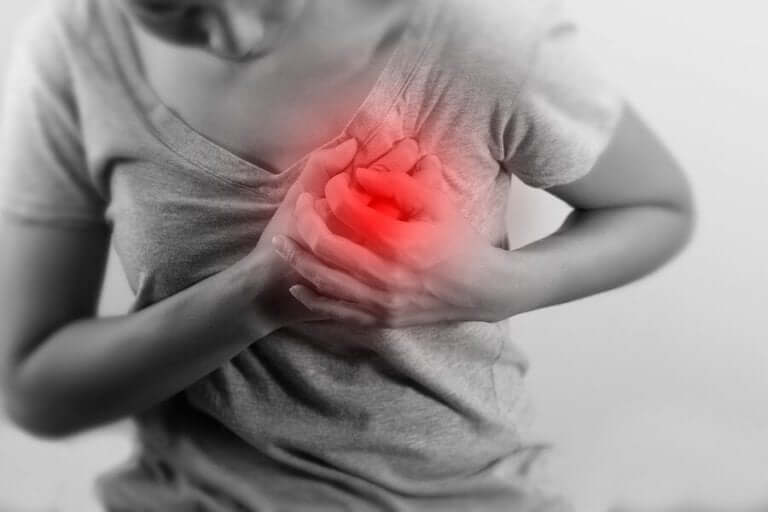What Is Holiday Heart Syndrome?

When it’s the holiday season, the number of celebrations and opportunities for binging, both food and drinks, is increasing. Therefore, holiday heart syndrome can take center stage again.
This syndrome is a condition that was described relatively recently in 1978. It’s an alteration of cardiac functioning from lots of alcohol in a short time.
The first time holiday heart syndrome was diagnosed was at this time of year. However, there are lots of cases in the summer as well. This is especially true in young people who have no other heart disease.
Specialists think that this syndrome causes a large number of cardiac arrhythmias. In fact, Christmas Day is the day with the most deaths from heart failure per year. Therefore, in this article, we’ll explain everything you need to know about holiday heart syndrome.
What is holiday heart syndrome?
As we already know, the heart is one of the most important organs in our body. It pumps blood all over our body. Also, cells get the oxygen they need to live.
For this to happen, the heart beats rhythmically and continuously. Since there’s a constant rhythm, the heart fills with blood properly. Blood can then move with the right amount of pressure.
With holiday heart syndrome, an arrhythmia occurs. Usually, this happens in one of the atria, which are the upper chambers of the heart. Then, the pace increases, and beats faster per minute.
Drinking lots of alcohol in a short amount of time causes it. For example, on specific holidays like Christmas or New Year’s Day, this is more common. These are days when people drink more than normal.
In addition, holiday heart syndrome affects young and healthy people. However, we don’t know exactly how alcohol causes this response. It seems that, during parties, it releases adrenaline and norepinephrine that speed up the heart rate.

You might like: Heart Palpitations: 4 Reasons You Might Feel Them
What are the symptoms of holiday heart syndrome?
As we mentioned, holiday heart syndrome can affect anyone. However, it’s most common in young and healthy people without previous heart disease.
Since it’s an arrhythmia, the most common symptom is palpitations. You feel like your heart is beating stronger and faster than normal. In addition, you can also feel chest pain and shortness of breath.
It’s common for people to also get dizzy, which can make them fall or faint. However, most of the symptoms disappear once their bodies have been able to metabolize all the alcohol.
Although it’s possible for the symptoms to be temporary, it’s important to keep an eye on anyone with these symptoms. Sometimes, this can put the patient’s life in danger.

You might be interested in: How to Know if You’re Addicted to Alcoholic Beverages
Can you prevent this situation?
Holiday heart syndrome only appears if you drink too much alcohol in a short amount of time. Therefore, the first step to avoid it is to not drink alcohol. However, if you do drink, make sure to drink responsibly.
It’s vital to tell young people about this syndrome. Many of them ignore the dangerous negative effects it can have. In addition, they think only older people get heart diseases.
On the other hand, excess alcohol consumption can also happen at barbecues, dinners, or banquets where there’s also a lot of food. Usually, there is food with lots of fat and sugar.
This type of eating already makes your heart work harder. For this reason, especially in the summer, don’t just watch how much alcohol you drink. In addition, pay attention to your diet, and, of course, also avoid any other types of drugs.
All cited sources were thoroughly reviewed by our team to ensure their quality, reliability, currency, and validity. The bibliography of this article was considered reliable and of academic or scientific accuracy.
- Advierten de un aumento del “síndrome del corazón” durante las vacaciones. (n.d.). Retrieved December 20, 2019, from https://www.abc.es/salud/noticias/20140728/abci-corazon-vacaciones-sindrome-201407281719.html
- Síndrome del corazón festivo – Síntomas y causas. (n.d.). Retrieved December 20, 2019, from https://www.aarp.org/espanol/salud/expertos/elmer-huerta/info-2014/corazon-festivo-sintomas-causas.html#slide1
- Por qué hay que evitar el corazón en vacaciones. (n.d.). Retrieved December 20, 2019, from https://www.desfibrilador.com/los-problemas-de-tener-el-corazon-en-vacaciones/
- El abuso del alcohol en verano, causante del síndrome del corazón en vacaciones – Fundación Española del Corazón. (n.d.). Retrieved December 20, 2019, from https://fundaciondelcorazon.com/prensa/notas-de-prensa/2673-abuso-del-alcohol-en-verano-causante-del-sindrome-del-corazon-en-vacaciones.html
This text is provided for informational purposes only and does not replace consultation with a professional. If in doubt, consult your specialist.








